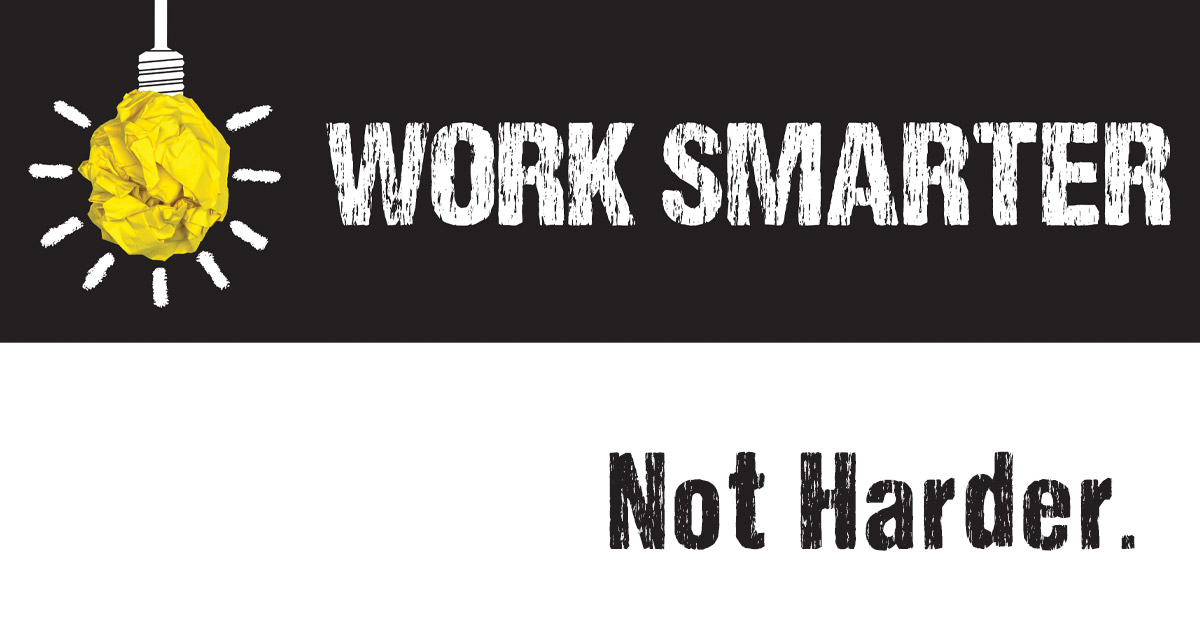It is the rare employee who works nine to five and leaves work behind. Most workers log in to catch-up late in the evening by reading and responding to e-mails, finishing reports or completing projects, making phone calls, or are on-call. With the demands of now versus later, employees understand they must apply the well-worn adage, “Work smarter, not harder,” to maintain a level of happiness, creativity, and enjoyment for the job.
But What Does It Mean?
Hard work has a definable long-term objective, which requires careful attention to detail. Similar to a juggler. If steps change, the circular process disconnects and fails. Longer hours equal exhaustion; however, the plan in working smarter offers more time to spend away from work.
Reflection Recognizes Success
The day-to-day can feel like a wheel. Regardless of the lack of air or the declining level of tread, the motion continues. While we often acknowledge our likes and dislikes, it is rare to recognize how you spend your time, because the wheel must spin! Do you find you are more alert and focused at a particular time of the day? And what aspects of your job are most enjoyable? You may enjoy communication or the result of a completed project. Great! It’s essential to identify the areas in which you shine!
Create a Daily Agenda
At times, it’s hard to sit in a chair for endless hours and concentrate. In those moments, the focus should transition to a low-priority task. One solution is to create a daily agenda. Be methodical in structuring your itinerary with the top priorities. By following a list, you’re less like to avoid straying from the goal and wasting hours on meaningless tasks.
The Group Pow-Wows
Working in an office opens the door to new relationships; however, it also can create awkward situations, such as forcing you to distance yourself from chatty co-workers and doorway chats. One solution is to use the need to work as a means to stay focused. Try saying, “I am in the middle of preparing for a phone call” or “Are you free to walk at 3:00? We can talk more privately then.” Signals may help indicate that you are not available. For instance, take time before looking up at the person standing at your door. Just remember, you can protect your time while balancing relationships.
Make Physical Exercise a Priority
Exhaustion arrives mid-morning, after lunch, and usually towards the end of the day; therefore, incorporate some form of physical activity into your schedule. Studies prove a healthy workforce is more productive, requires less health care, and is infrequently absent. Think beyond your need to stretch your legs and feet. A brisk walk can replace the choice to grab a snack. Time away from your screen and phone is an essential part of the “work smarter” movement. Invite a few colleagues and dedicate time to walking the parking lot. You’ll discover others will join your “club,” and soon, the mornings will include a 20-minute powerwalk before the workday even begins!
Make After-Work Plans
The workday must end sometime! Right? An external force, such as planning an evening with the family or friends, could be the right motivation to stay on task! While you may think after-work events as costly, consider planning low-cost get-togethers such as a dinner-in and a movie, or participating in a game night. The goal of creating a “work-free evening” is to help you remain focused at work while enjoying your time!
No matter if you are a student or employee, the tips for working smarter, not harder apply to everyone. It takes reflection, a plan, a promise to yourself to stay on task, and to separate work from your personal life. It’s possible, especially if you want to feel enthusiastic and ready to welcome another Monday morning! Every day you can creatively increase your performance!



















